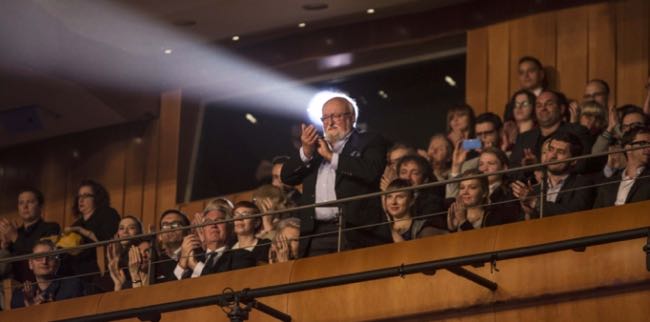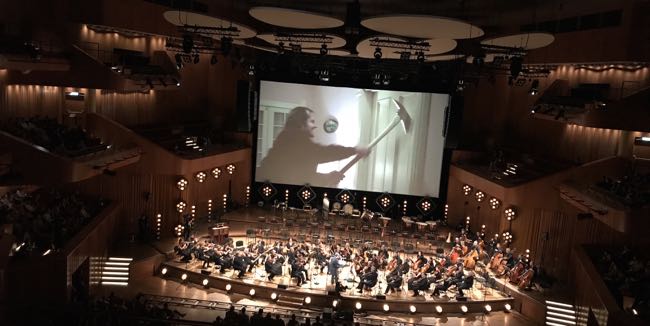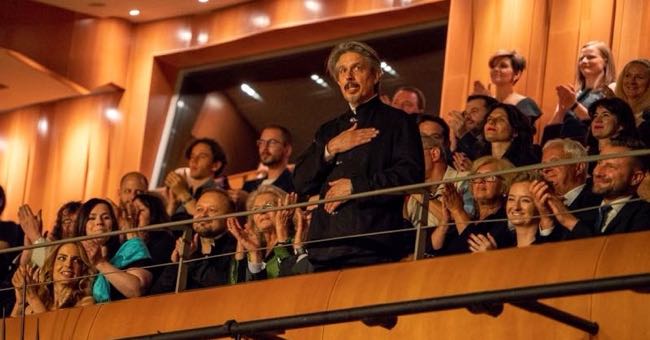By Ray Bennett
KRAKÓW – Krzysztof Penderecki does not make music for movies, directors make films for his music. That, at least, is how it appeared at the Kraków Film Music Festival’s Penderecki2Cinema concert Wednesday evening.
The legendary Polish composer (above), celebrating his 85th birthday, was on hand to accept several standing ovations after conductor Dirk Brossé led the National Polish Radio Orchestra through four of his most acclaimed works that were written for the concert hall but have featured in iconic movies by directors such as Stanley Kubrick, Martin Scorses and Andrzej Wajda.
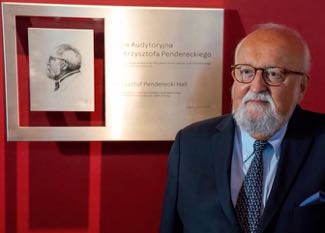 Before the concert, the large, versatile and acoustically adaptable ICE Kraków Auditorium Hall was renamed Krzysztof Penderecki Hall with a plaque bearing a steel etching of a copperplate depiction of his profile. Krakow Mayor Jacek Majchrowski, who presided over the opening ceremony, noted that the world-renowned composer has been part of the fabric of the city for more than 60 years so to name the hall for him “seems to be a natural step”. But he said that the question was: “Is the hall worthy of him? Were the acoustics fine enough?” Penderecki approved, “so we decided to go ahead.”
Before the concert, the large, versatile and acoustically adaptable ICE Kraków Auditorium Hall was renamed Krzysztof Penderecki Hall with a plaque bearing a steel etching of a copperplate depiction of his profile. Krakow Mayor Jacek Majchrowski, who presided over the opening ceremony, noted that the world-renowned composer has been part of the fabric of the city for more than 60 years so to name the hall for him “seems to be a natural step”. But he said that the question was: “Is the hall worthy of him? Were the acoustics fine enough?” Penderecki approved, “so we decided to go ahead.”
Filmmakers must have asked themselves a similar question over the years and the many clips shown during the concert suggest they often succeeded. Maestro Brossé’s command of the music was majestic as the orchestra gave spine-tingling renditions of “Threnody to 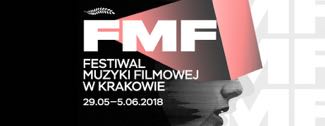 the Victims of Hiroshima for 52 Strings”, “Symphony No. 2, I-II Moderato – Allegretto”, “Polymorphia for 48 strings” and “Symphony No. 3, IV Passacaglia – Allegro Moderato”. Scenes from William Friedkin’s “The Exorcist” (1973), Kubrick’s “The Shining” (1980, above), Peter Weir’s “Fearless” (1993), Cuaron’s “Children of Men” (2006), Wadja’s “Katyn” (2007), Scorsese’s “Shutter Island” (2010), Pablo Larraín’s “Neruda” and David Lynch’s “Twin Peaks” (2017) illustrated Penderecki’s already vividly evocative expressions of emotion.
the Victims of Hiroshima for 52 Strings”, “Symphony No. 2, I-II Moderato – Allegretto”, “Polymorphia for 48 strings” and “Symphony No. 3, IV Passacaglia – Allegro Moderato”. Scenes from William Friedkin’s “The Exorcist” (1973), Kubrick’s “The Shining” (1980, above), Peter Weir’s “Fearless” (1993), Cuaron’s “Children of Men” (2006), Wadja’s “Katyn” (2007), Scorsese’s “Shutter Island” (2010), Pablo Larraín’s “Neruda” and David Lynch’s “Twin Peaks” (2017) illustrated Penderecki’s already vividly evocative expressions of emotion.
His music is shattering as tension grows portentously, bows drawn achingly, eldritch sounds filled with menace that tickle the back of the neck; cacophonous with the strings of bass, cello and violin plucked and scratched, violin bodies tapped and slapped, building to a clamorous frenzy like a flock of disturbed ravens crying havoc, fleeing in chaotic panic from some nameless dread; and celebratory as horns and woodwinds begin to soar. No wonder filmmakers cannot resist.
The other highlight of the evening was the world premiere of Oscar-winning American composer Elliot Goldenthal’s breathtaking “Concerto for Trumpet and Strings”, which he wrote as the result of receiving the festival’s first Wojciech Kilar Award in 2015.
Dedicated to 18th century Polish hero Tadeusz Kościuszko, a formative figure in the American Revolution, Goldenthal (above) said he was inspired by the bugles that call out from the tower of St. Mary’s Church in Kraków’s Grand Square every hour of every day. His enthusiasm for the performance of the orchestra and the splendid tone of Norwegian trumpet soloist Tine Thing Helseth was matched by the audience’s eruption of appreciation for musicians and composer at the end of the 17-minute concerto. Challenging, complex and eloquent, it offers passages that invite rapt attention and then splinters into unexpected dips, dives and flights of power and emotion. Goldenthal said afterwards that he would love to have the same orchestra, conductor and soloist make the first recording of the concerto.
The evening began with three Penderecki pieces in the Baroque style and then, in the absence of this year’s Kilar Award-winner Michael Nyman’s, a performance of his “The Piano for Strings” from the soundtrack of Jane Campion’s 1996 picture “The Piano”.
The concert ended with rapturous applause from a grateful audience and the scene afterwards of the two masters, Penderecki and Goldenthal, deep in conversation. Penderecki had said, at the earlier dedication of the Auditorium Hall in his name, he had always hoped that one day long after his death he might be recognised in such a way. For it to happen now, “There is no greater joy,” he said. “I arrived in Kraków in 1951 and I did dream that I might achieve something in the city. Maybe it is the city that has made me a composer.”
Photos: Penderecki, Goldenthal FMF; ‘The Shining’ my photo; bottom photo courtesy of Varèse Sarabande’s Robert Townson

